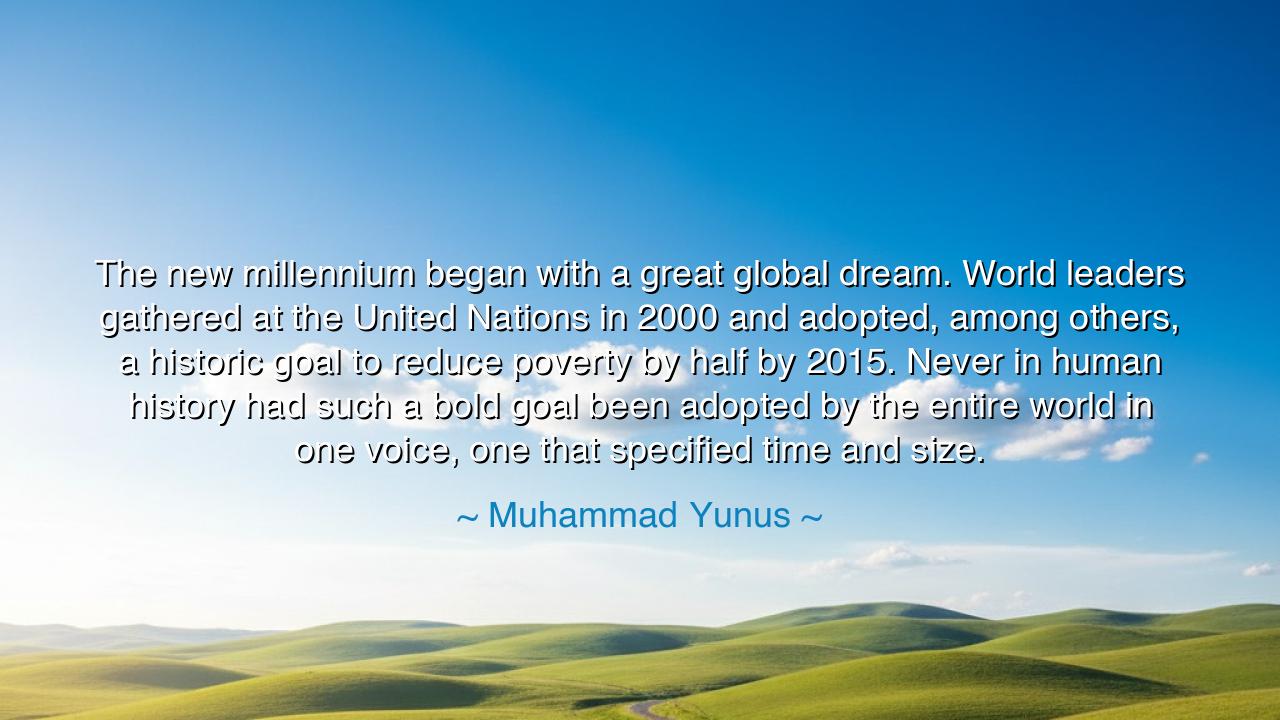
The new millennium began with a great global dream. World leaders
The new millennium began with a great global dream. World leaders gathered at the United Nations in 2000 and adopted, among others, a historic goal to reduce poverty by half by 2015. Never in human history had such a bold goal been adopted by the entire world in one voice, one that specified time and size.






In the dawn of the new millennium, when the fires of the old century had dimmed and the world sought to rise from its ashes, Muhammad Yunus spoke of a dream that bound humanity together. “The new millennium began with a great global dream. World leaders gathered at the United Nations in 2000 and adopted, among others, a historic goal to reduce poverty by half by 2015. Never in human history had such a bold goal been adopted by the entire world in one voice, one that specified time and size.” These are not merely the words of a witness—they are the song of a seer, a man who heard the pulse of humanity’s yearning for justice. In this dream was the echo of all who had ever struggled against hunger and despair. It was as if the earth itself, long silent under the weight of suffering, had spoken through the united voice of humankind: Let poverty end, and let dignity rise.
In the style of the ancients, we might say that this was the Age of Resolve, when the world first gathered as one tribe to confront its greatest shadow. Throughout history, kingdoms and empires had fought for conquest, for wealth, for power. But rarely—if ever—had all nations stood together for compassion, for human upliftment, for the ending of want. This unity was not born from convenience but from awakening. It was as if humanity, after centuries of wandering, finally looked inward and realized that the true enemy was not each other, but the chains of poverty that bound the hands and dreams of billions. Yunus, who gave voice to the poor through his vision of microcredit, saw this not merely as a political act, but as a spiritual one—the collective rise of conscience on a global scale.
To understand this moment, one must recall the story of Dr. Yunus himself, walking through the villages of Bangladesh after a terrible famine. He saw mothers who starved so their children might eat, and laborers who toiled endlessly for pennies they would never keep. From this sorrow was born his revolutionary idea: to lend hope instead of pity, to offer small loans that would kindle self-reliance. A woman with a single goat could become a provider. A weaver could become an entrepreneur. Poverty, he realized, was not a lack of ability—it was a lack of opportunity. His vision spread like fire across nations, and so when the world declared its intention to reduce poverty by half, it was as if Yunus’s personal revelation had become the shared mission of humankind.
Yet, the wise know that dreams are fragile, and that even the most righteous vision can falter if not nurtured. Many who proclaimed the Millennium Development Goals did so with sincerity, yet the path ahead was steep. Wars, greed, corruption, and indifference remained fierce adversaries. Still, the act of unity itself was sacred—a declaration that the spirit of humanity had not withered in the face of despair. To aim for such an impossible thing, to seek to uplift billions in fifteen short years, was to defy the cynicism of history. The ancients would have called it a heroic vow—the kind of promise only made by those who believe the divine still dwells in the human heart.
Consider, then, what it means for an entire world to speak “in one voice.” It is not simply to agree—it is to remember that despite our divisions of color, creed, and nation, the hunger of one is the hunger of all. The child without bread in a faraway land is a reflection of our own humanity diminished. When the world chose to pursue this dream, it took the first steps toward a moral civilization, one measured not by the wealth of a few but by the well-being of all. For in the great circle of life, no one is truly rich while another remains destitute; no nation truly prospers while another starves in silence.
And though 2015 came and went, and poverty still lingers in the shadows, let us not call the dream a failure. The ancients would remind us: a mountain is not conquered in one sunrise. What mattered most was that the dream was born—that humanity, for once, lifted its gaze beyond borders and sought to heal its collective wound. For in daring to imagine a world without poverty, mankind awakened its own moral potential, its divine capacity for empathy and creation. Yunus’s words remind us that even the act of dreaming together is a form of transformation, for what the world dares to dream, it can one day become.
So let this teaching endure for generations to come: great change begins with a shared dream, spoken with sincerity, pursued with courage, and nourished with compassion. Each of us must be a part of this vision—not through speeches, but through action. Feed one hungry soul. Lend a hand to one in need. Create with the intention to uplift. For the grandest revolutions are born not from the towers of power, but from the hearts of ordinary people who believe the world can be remade in the image of mercy. And when we walk together in that spirit, the promise of the new millennium will not remain a memory—it will live on as a flame, guiding humanity toward its long-awaited dawn.






AAdministratorAdministrator
Welcome, honored guests. Please leave a comment, we will respond soon